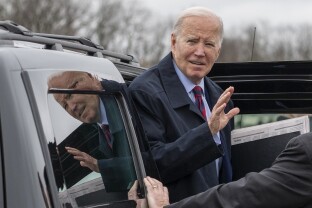Processional music was already playing in the Capitol rotunda and Donald Trump’s inauguration was underway when President Joe Biden issued a slate of sweeping pardons — for his family.
Included in the preemptive pardons were Biden’s siblings, Francis W. Biden, James B. Biden, Valerie Biden Owens, and their spouses, Sara Jones Biden and John T. Owens.
“For any nonviolent offenses against the United States which they may have committed or taken part in during the period from January 1, 2014, through the date of this pardon,” the grant of clemency read.
It’s a highly unusual move that signals just how much uncertainty there is over what Trump will do after he is sworn in Monday and how much political sway he may hold over the Department of Justice.
Trump has repeatedly called for investigations into the Biden family. While Biden previously also granted his son Hunter a “full and unconditional pardon,” he did not include himself in this slate of pardons.
Earlier Monday, Biden issued sweeping preemptive pardons to high-profile people the outgoing White House suspected could be targeted for prosecution by the incoming Trump administration.
Biden pardoned Gen. Mark Milley, who had been chair of the Joint Chiefs of Staff; Anthony Fauci, who had helped lead the government’s COVID-19 response; and the members of Congress who had served on the select committee that investigated the Jan. 6 attacks. The members of the committee include former Rep. Liz Cheney, who has been a frequent political target for Trump.
“I believe in the rule of law, and I am optimistic that the strength of our legal institutions will ultimately prevail over politics,” Biden said in a statement. “But these are exceptional circumstances, and I cannot in good conscience do nothing.”
“These public servants have served our nation with honor and distinction and do not deserve to be the targets of unjustified and politically motivated prosecutions,” the statement read.
Taylor Budowich, a top communications aide for Trump’s incoming White House, said Biden’s pardons “will go down as the greatest attack on America’s justice system in history.”
“With the stroke of a pen, he unilaterally shielded a group of political cronies from the scales of justice,” he wrote on X.
Trump has suggested that his incoming DOJ should at least investigate some of his political opponents for crimes.
In a recent NBC News interview, Trump was asked specifically about the possibility of preemptive pardons for members of the select committee. “For what they did, honestly, they should go to jail,” he told Kristen Welker, while saying he would be more focused on policy priorities than directing their prosecution.
Lawmakers involved with the select committee investigating Jan. 6 will now be covered for “any offenses against the United States which they may have committed or taken part in arising from or in any manner related to” the investigation.
Fauci received a similar exemption for his time as the director of the National Institute of Allergy and Infectious Diseases, a member of the White House Coronavirus Task Force, the White House COVID-19 Response Team and as chief medical adviser to the president.
In an interview on CNN, Fauci said he was “appreciative” of the preemptive pardon.
“We did nothing wrong, but the baseless accusations and threats are real for me and my family,” Fauci said.
After Milley was the subject of a profile in The Atlantic, Trump suggested that he should be “put to DEATH” for treason in a Truth Social post. Milley has consistently challenged Trump while always citing his own role in protecting the Constitution. Shortly after walking through Lafayette Square with Trump amid mass protests in 2020, Milley said, “I should not have been there.”
He’s always argued “for an apolitical military” rooted in “the very essence of our Republic.” But in his retirement speech, after 44 years in service, Milley suggested Trump was “a wanna-be dictator.”
Military legal experts told NOTUS that Milley might have been open to legal action against him in a new Trump administration. Members of the military are still subject to the Uniform Code of Military Justice as long as they receive their retirement pay. Milley could, in theory, be recalled on active duty and tried for “Conduct unbecoming” and “Contempt towards officials.” It is unclear if Biden’s pardon would cover Milley under UCMJ.
Milley’s pardon specifically included any of his conduct from the beginning of 2014 until now that may have fallen under UCMJ.
—
John T. Seward is a NOTUS reporter and an Allbritton Journalism Institute fellow.
Sign in
Log into your free account with your email. Don’t have one?
Check your email for a one-time code.
We sent a 4-digit code to . Enter the pin to confirm your account.
New code will be available in 1:00
Let’s try this again.
We encountered an error with the passcode sent to . Please reenter your email.


